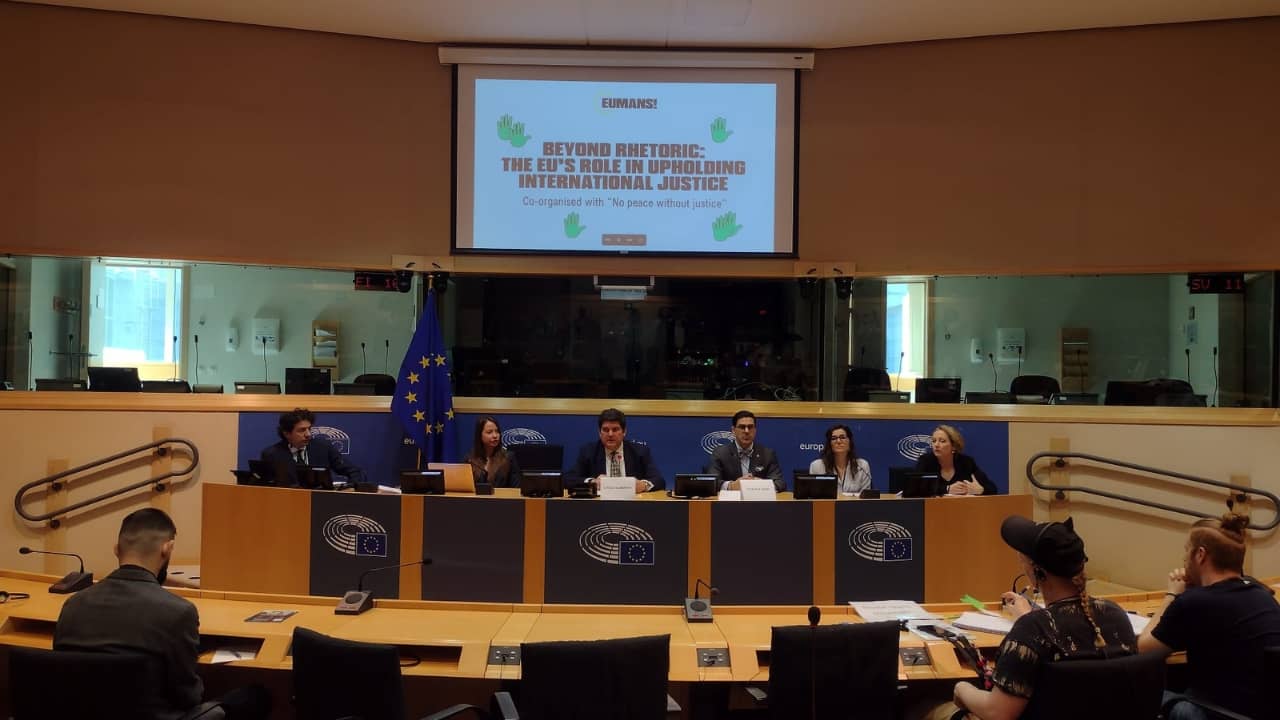What is the European Parliament?
The European Parliament (EP) is the only parliamentary institution of the European Union (EU) that is directly elected by EU citizens aged 18 or older. Together with the Council of the European Union, it exercises the legislative function of the EU. The Parliament is composed of 751 members (MEPs), which will become 705 after specific provisions on Brexit are adopted. The EP represents the largest trans-national democratic electorate in the world.
PGA’s Work
Through its engaged members at the European Parliament, PGA advances the essential role of the EU in the fight against impunity.
Some of the most relevant recent activities include:
- On 2 October 2019, Members of the European Parliament (MEPs) and their representatives gathered with members of civil society organizations to discuss the essential role of the European Union (EU) in the fight against impunity. The participants in the discussion contributed to the development of 10 Action Points to Strengthen the Role of the European Union in Fighting Impunity, including increasing support towards the ICC and fight against impunity, as well as engagement with States within and beyond the EU to improve functioning of their domestic jurisdictions to fight impunity.
- In June 2018, PGA member, Ms. Ana Maria Gomes played, MEP (Portugal), an instrumental role in the establishment of the European Union Special Representative for International Humanitarian Law and International Justice, as demonstrated in a joint MEP initiative, a letter sent to the High Representative of the Union for Foreign Affairs and Security Policy and Vice-President of the European Commission, Federica Mogherini, in 2018.
- On 18 April 2018, PGA’s long-standing member, Ms. Barbara Lochbihler, MEP (Germany), Group of the Greens/European Free Alliance, authored a Joint Motion for the Resolution adopted by the European Parliament adopted strongly condemning the situation in the Philippines and calling the Government to put a halt on abusive practices and safeguard the Rule of Law, democracy, and respect for human rights.
- In December 2017, Ms. Barbara Lochbihler, MEP (Germany), tabled an amendment to the Resolution condemning repression and continued serious human rights violations allegedly committed by the Government of Myanmar against Rohingyas, a predominantly Muslim minority group living in Rakhine State in Myanmar. The Amendment called on the Government of Myanmar to bring to justice the perpetrators of grave human rights crimes committed against Rohingya by submitting an ad hoc declaration of acceptance of the ICC jurisdiction under Art. 12 (3) of the Rome Statute, or, alternatively, urging the United Nations Security Council to refer the situation to the ICC according to Art. 13(b) of the Rome Statute. The amendment was strongly endorsed and adopted by the Plenary of the European Parliament.
- On 28th September 2017, PGA organized a strategic discussion on how the support for the Trust Fund for Victims (TFV) at the International Criminal Court (ICC) can be integrated into a Corporate Social Responsibility (CSR) Strategy of private companies. The event was hosted by the chair of the PGA European Parliamentary Group, Ms. Ana Maria Gomes, MEP, and attended by members of the European Parliament, European Commission, EU’s European External Action Service and other institutions, a Board Member and the Executive Director of the TFV, members of the corporate and philanthropic communities and non-governmental organisations.
- In May 2016, PGA organized a Breakfast Meeting with its members at the European Parliament concerning EU Foreign and Security Policy with a specific focus on effective measures to prevent and counter violent extremism. The topics discussed included Daesh/ISIS and the promotion of peace, justice, and human rights under the Rule of Law in crisis and conflict situations that are a priority for the EU, including Syria/Iraq, Libya, Yemen and Ukraine.
- In July 2014, the European Parliament adopted a Resolution calling on States to adopt the Amendments on the crime of aggression (Kampala Amendments). The Resolution was initiated by PGA Member, Ms. Barbara Lochbihler, MEP (Germany).
- In February 2014, Ms. Barbara Lochbhiler, MEP (Germany), PGA member and Chair of the informal group of “Friends of the ICC” hosted the Working breakfast / Strategy Meeting on EU Support to the ICC at the European Parliament. At the meeting, all participating MPs agreed on the wording of the EP Plenary Resolution to promote the ratification and implementation of the Kampala Amendments. This resolution was adopted in July 2014, and included on the action plan in the plenary Agenda as a way to encourage European Union Countries to ratify the Amendments to the Rome Statute.
- In 2013, Mr. Helmut Scholz (then Chairperson of PGA Group in the European Parliament and member of the informal group of the European Parliament “Friends of the ICC”) organized a meeting on ‘A promise for the end of illegal use of force in international relations’.




